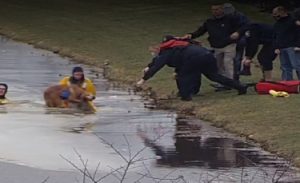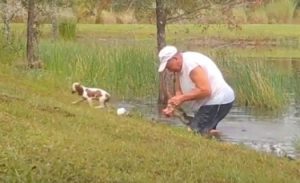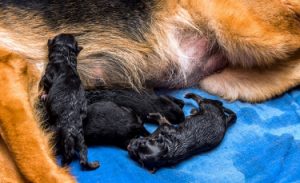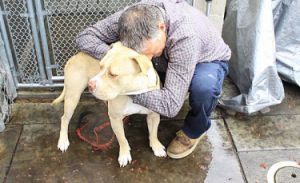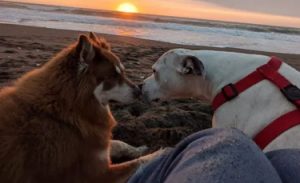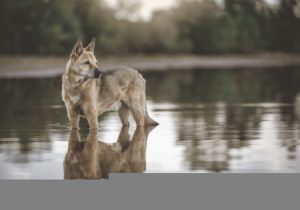Other names: Nova Scotia Retriever, Nova Scotia Duck Tolling Retriever
The Nova Scotia Retriever is a medium-sized dog with a compact build, powerful and well-proportioned, with well-developed musculature and fairly heavy bones. However, this does not prevent it from displaying remarkable agility. The gaits of the Nova Scotia Retriever are characterized by fast, active, flexible and clear movements.
<!–
–>
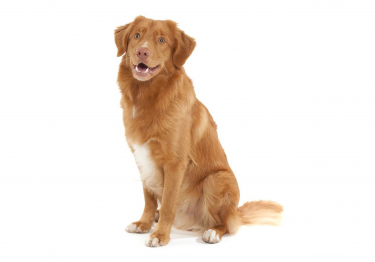
| Half-long | |
| Canada | |
| Average | |
| Long |
| Sex | Weight | Cut |
|---|---|---|
| Female | From 18 kg to 20 kg | From 45 cm to 49 cm |
| Male | From 20 kg to 23 kg | From 47 cm to 51 cm |
History of the breed
As its name suggests, this dog is originally from Nova Scotia , a province on the east coast of Canada. The Nova Scotia Retriever breed was developed in this region from the early 19th century. She was specifically bred for duck hunting.
Nova Scotia Retriever Pictures
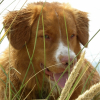
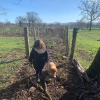
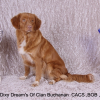

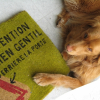
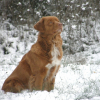
View all Nova Scotia Retriever photos from Woopets members
Physical features
His hair: medium length, soft, straight to slightly wavy. The outer coat is associated with a dense and soft undercoat, the whole giving the dog a very good resistance to cold and humidity. Forming abundant fringes on the tail.
Its color: all shades ranging from red to orange, with lighter colored fringes and a white mark at the end of the tail, feet, chest and muzzle (list).
His head: well drawn, well proportioned to the whole and almost wedge-shaped. The skull is broad and a little rounded, the occiput not prominent, the cheeks flat, the stop moderately marked, the nose tapering towards its extremity, the nostrils well open, the lips well applied, the jaws powerful and articulated in scissors.
His ears: medium in size, triangular in shape, set high, slightly raised at birth.
His eyes: medium size, amber to brown in color, almond shaped, displaying a look full of liveliness and intelligence.
His body: harmoniously proportioned, with medium to heavy frame, but allowing great agility. The neck is well muscled and of medium length, the top line horizontal, the back short and straight, the loins solid, the chest well let down to the elbows, the sides well supported and the belly slightly raised.
Its tail: covered with abundant fringes, thick at its base, carried at the level of the line of the back or lower when the dog is at rest, raised and curved when it is in action.
Behavior and character
| Affectionate | |
|---|---|
| Calm | |
| Protective | |
| Independent | |
| Hunter | |
| Barks / howls |
Behavior with others
| Cohabitation with children | |
|---|---|
| Sociable with other animals | |
| Love strangers |
the Nova Scotia Retriever is an intelligent, playful and alert dog . Specialized in duck hunting , he loves to move in the water to bring back game after the gunshot. Outside of the hunt, the Nova Scotia Retriever shows off its cheerful , affectionate and energetic temperament.
The Nova Scotia Retriever
is it right for you? Take the test!
Education
| Clever | |
|---|---|
| Obedient |
The education of the Nova Scotia Retriever requires a certain firmness , but without balance of power. His intelligence, his taste for work and his receptivity greatly facilitate his learning, especially through positive reinforcement and play . It is important to teach him to recall from a young age .
Living conditions
| Suitable for apartment living | |
|---|---|
| Good for new masters | |
| Love it hot | |
| Love the cold |
the Nova Scotia Retriever is intended for active teachers , willing to take it for a walk and play it frequently. He gets along with the whole family and needs space. A house with a large fenced garden would therefore be the ideal living environment for this dog.
Health
| Solid | |
|---|---|
| Ease of gaining weight |
the Nova Scotia Retriever is a robust and resistant dog , especially in the face of bad weather and cold thanks to its double and dense coat. There is no predisposition to a disease, with the exception, in some subjects, pyotraumatic dermatitis (also called hot spot ), which corresponds to acute weeping dermatitis.
Hypoallergenic breed
No
Litter size
Between 6 and 10 puppies
| Major concerns |
|
||||
| Minor concerns |
|
| Occasional concerns |
|
||
| Suggested tests |
|
To guard against these risks and insure your companion in the event of health problems, Woopets recommends Nova Scotia Retriever dog insurance .

function showAssuranceForm () {var siteReferer = var id_race_association = ‘236’; //console.log(id_race_association);success: function (html) {}});}document.addEventListener (‘DOMContentLoaded’, () => {$ (‘# assuranceModalBanner’). on (‘show.bs.modal’, function (event) {showAssuranceForm ();});});
Life expectancy
Minimum: 12 years old
Maximum: 14 years
The life expectancy of a Nova Scotia Retriever is, on average, between 12 years and 14 years.
Calculate the Human Age of Your Nova Scotia Retriever!
To choose… 1 year 2 years 3 years Four years 5 years 6 years 7 years 8 years 9 years 10 years 11 years old 12 years 13 years 14 years old 15 years old 16 years old 17 years 18 years old 19 years old 20 years 21 years old
Maintenance and hygiene
| Ease of maintenance | |
|---|---|
| Cost of maintenance | |
| Hair loss |
| Drool level | |
|---|---|
| Ease of grooming |
the Nova Scotia Retriever is subject to seasonal shedding during which it can lose a lot of hair. Outside this period, its maintenance does not present any particular constraint , as long as it is carried out on a regular basis.
It is recommended to brush the dog once a week . During the moult, brushing becomes more frequent, even daily. It can be bathed occasionally , if needed.
The claws need to be maintained regularly, just like the ears, which must be examined and cleaned once a week to prevent infections. His teeth need to be brushed frequently to remove tartar build-up and the proliferation of bacteria.
Price and budget
Purchase price
Mini
€ 1,200 Maxi
1600 €
The purchase price of a Nova Scotia Retriever is between $ 1,200 and $ 1,600.
Annual maintenance cost
Mini
400 € Maxi
600 €
The annual maintenance cost of a Nova Scotia Retriever is between $ 400 and $ 600.
No name is currently proposed. Use our tool to find the name of your Nova Scotia Retriever!
Food
The Nova Scotia Duck Tolling Retriever needs a power quality and équlibrée, adapted to its activity level, size and age. Its food is to be divided into 2 meals per day .
Want the best for your dog?
Create the tailor-made diet for your Nova Scotia Retriever
I discover !
PROMO -30% | Delivered to you!

Physical activity
| Athletic | |
|---|---|
| Energy level | |
| Potential to play |
the Nova Scotia Retriever is an active dog and therefore needs one or two long walks a day . He also needs to play with his owner and must have the possibility of evolving regularly on natural sites, ideally with water points.
Competitions
| Classifications & Standards |
|
Others
| Master character <span class="btnTooltip qTip2" title="- Calm: the master must be gentle and know how to show patience. – Active: the owner must be energetic and dynamic to live in harmony with his dog. – Hyperactive: the owner must be stimulating and very restless to suit the temperament of his dog.”> |
Active |
|---|
We talk on the forum
The Nova Scotia Retriever
Guest message
Golden retriever
Adep message
Gorgeous Golden Retriever is looking for female to build a family!
Message from Aurelie78125
golden retriever … humor
Message from Joo
Flat coated retriever puppies
Message from Abreu Carlos
Have a question about the Nova Scotia Retriever?
Do not hesitate to ask Woopets visitors for advice on the forum!
FCI Information
FCI No.
312
FCI Group
Group 8: Retrieving game dogs – Game-raising dogs – Water dogs
Recognized by FCI
Since 1981
</div


